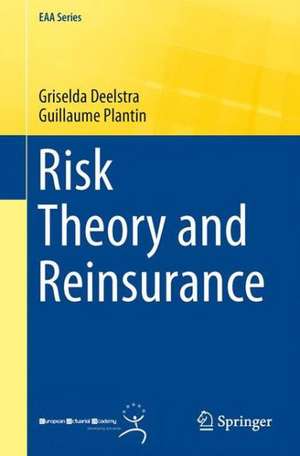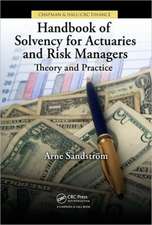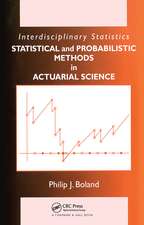Risk Theory and Reinsurance: EAA Series
Autor Griselda Deelstra, Guillaume Plantinen Limba Engleză Paperback – 5 dec 2013
The first part of the book covers risk theory. It presents the most prevalent model of ruin theory, as well as a discussion on insurance premium calculation principles and the mathematical tools that enable portfolios to be ordered according to their risk levels.
The second part describes the institutional context of reinsurance. It first strives to clarify the legal nature of reinsurance transactions. It describes the structure of the reinsurance market and then the different legal and technical features of reinsurance contracts, known as reinsurance ‘treaties’ by practitioners.
The third part creates a link between the theories presented in the first part and the practice described in the second one. Indeed, it sets out, mostly through examples, some methods for pricing and optimizing reinsurance. The authors aim is to apply the formalism presented in the first part to the institutional framework given in the second part. It is reassuring to find such a relationship between approaches seemingly abstract and solutions adopted by practitioners.
Risk Theory and Reinsurance is mainly aimed at master's students in actuarial science but will also be useful for practitioners wishing to revive their knowledge of risk theory or to quickly learn about the main mechanisms of reinsurance.
Preț: 370.25 lei
Nou
Puncte Express: 555
Preț estimativ în valută:
70.84€ • 73.98$ • 58.50£
70.84€ • 73.98$ • 58.50£
Carte tipărită la comandă
Livrare economică 11-17 aprilie
Preluare comenzi: 021 569.72.76
Specificații
ISBN-13: 9781447155676
ISBN-10: 144715567X
Pagini: 88
Ilustrații: VIII, 78 p. 3 illus.
Dimensiuni: 155 x 235 x 5 mm
Greutate: 1.47 kg
Ediția:2014
Editura: SPRINGER LONDON
Colecția Springer
Seria EAA Series
Locul publicării:London, United Kingdom
ISBN-10: 144715567X
Pagini: 88
Ilustrații: VIII, 78 p. 3 illus.
Dimensiuni: 155 x 235 x 5 mm
Greutate: 1.47 kg
Ediția:2014
Editura: SPRINGER LONDON
Colecția Springer
Seria EAA Series
Locul publicării:London, United Kingdom
Public țintă
GraduateCuprins
Elements of Risk Theory.- Reinsurance Market Practices.- Optimal Reinsurance.
Recenzii
“The book was written by two well-known actuarial scientists and economists. They give a very interesting mix of introductory notes to risk theory and optimal reinsurance, which were typically treated separately in existing books. … This research monograph would be a great introductory book for graduate students and beginning researchers who want to get a glimpse of research works in these two fields … .” (Runhuan Feng, zbMATH 1309.91002, 2015)
Textul de pe ultima copertă
Reinsurance is an important production factor of non-life insurance. The efficiency and the capacity of the reinsurance market directly regulate those of insurance markets. The purpose of this book is to provide a concise introduction to risk theory, as well as to its main application procedures to reinsurance.
The first part of the book covers risk theory. It presents the most prevalent model of ruin theory, as well as a discussion on insurance premium calculation principles and the mathematical tools that enable portfolios to be ordered according to their risk levels.
The second part describes the institutional context of reinsurance. It first strives to clarify the legal nature of reinsurance transactions. It describes the structure of the reinsurance market and then the different legal and technical features of reinsurance contracts, known as reinsurance ‘treaties’ by practitioners.
The third part creates a link between the theories presented in the first part and the practice described in the second one. Indeed, it sets out, mostly through examples, some methods for pricing and optimizing reinsurance. The authors' aim is to apply the formalism presented in the first part to the institutional framework given in the second part. It is reassuring to find such a relationship between approaches, seemingly abstract, and solutions adopted by practitioners.
Risk Theory and Reinsurance is mainly aimed at graduate students in actuarial science but will also be useful for practitioners wishing to revive their knowledge of risk theory or to quickly learn about the main mechanisms of reinsurance.
The first part of the book covers risk theory. It presents the most prevalent model of ruin theory, as well as a discussion on insurance premium calculation principles and the mathematical tools that enable portfolios to be ordered according to their risk levels.
The second part describes the institutional context of reinsurance. It first strives to clarify the legal nature of reinsurance transactions. It describes the structure of the reinsurance market and then the different legal and technical features of reinsurance contracts, known as reinsurance ‘treaties’ by practitioners.
The third part creates a link between the theories presented in the first part and the practice described in the second one. Indeed, it sets out, mostly through examples, some methods for pricing and optimizing reinsurance. The authors' aim is to apply the formalism presented in the first part to the institutional framework given in the second part. It is reassuring to find such a relationship between approaches, seemingly abstract, and solutions adopted by practitioners.
Risk Theory and Reinsurance is mainly aimed at graduate students in actuarial science but will also be useful for practitioners wishing to revive their knowledge of risk theory or to quickly learn about the main mechanisms of reinsurance.
Caracteristici
Provides a concise introduction to risk theory and its application procedures to reinsurance Applies the formalism of risk theory to the institutional framework of reinsurances Useful for both academics and practitioners wishing to revive their knowledge of risk theory or to quickly learn about the main mechanisms of reinsurance Includes supplementary material: sn.pub/extras


























